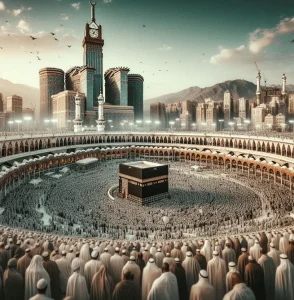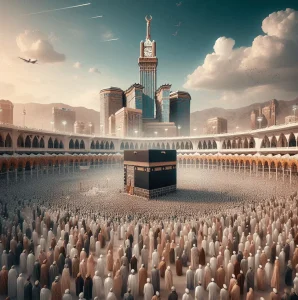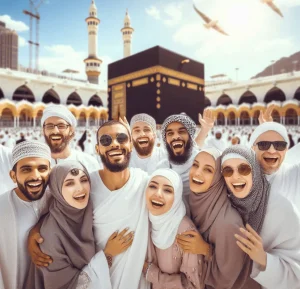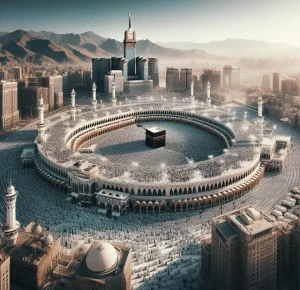Table of Contents
Mecca The journey of Hajj is a profound spiritual odyssey that transcends physical boundaries and touches the depths of the soul. It is a pilgrimage of the heart, mind, and spirit, culminating in a sacred communion with the Divine. In this article, we delve into the essence of Hajj, exploring its significance, rituals, and transformative power as pilgrims embark on a spiritual voyage from Mecca to the soul.

The Sacred Sanctity of Mecca
Mecca, the birthplace of the Prophet Muhammad (peace be upon him), holds a central place in the hearts of Muslims worldwide. It is home to the Kaaba, the holiest shrine in Islam, towards which Muslims turn in prayer five times a day. The Kaaba serves as a focal point for unity, devotion, and spiritual connection, drawing millions of pilgrims from every corner of the globe.
The Kaaba: Symbol of Unity
The Kaaba stands as a symbol of unity, representing the spiritual center of Islam. Its black draped cloth, adorned with Quranic verses, Mecca symbolizes the unity of the Muslim Ummah (community) and the oneness of Allah. Pilgrims circumambulate the Kaaba during Hajj, expressing their devotion and reverence for the Creator.
The Grand Mosque: Heart of Mecca
The Grand Mosque, encompassing the Kaaba, is a sprawling complex that pulsates with the energy of worship and devotion. Its majestic architecture, adorned with intricate designs and calligraphy, creates a sense of awe and reverence among pilgrims. Within its walls, believers engage in acts of prayer, supplication, and reflection, seeking closeness to Allah.
The Spiritual Significance of Hajj
Hajj is more than a physical journey; it is a spiritual quest of immense significance. Rooted in the traditions of the Prophet Ibrahim (Abraham) and his family, Hajj symbolizes obedience, sacrifice, and submission to the will of Allah. Through its rituals, pilgrims undergo a profound spiritual transformation, emerging purified and renewed in their faith.
Rituals of Renewal
The rituals of Hajj are imbued with deep spiritual meaning, each serving as a step towards spiritual renewal and purification:
- Ihram: Pilgrims enter a state of consecration, donning simple white garments that signify purity and equality before Allah.
- Tawaf: Circling the Kaaba seven times, pilgrims affirm their commitment to the worship of the One God, seeking His mercy and forgiveness.
- Sa’i: Walking between the hills of Safa and Marwah, pilgrims commemorate the search for water by Hajar (Hagar), expressing trust in Allah’s providence.
- Arafat: Standing in prayer on the plains of Arafat, pilgrims seek forgiveness and mercy, symbolizing the Day of Judgment and the ultimate accountability before Allah.
- Muzdalifah: Spending the night in prayer and reflection, pilgrims collect pebbles for the symbolic stoning of the devil, reaffirming their rejection of sin and temptation.
- Ramy al-Jamarat: Stoning the pillars in Mina, pilgrims demonstrate their defiance against evil and their commitment to righteousness.
- Eid al-Adha: The culmination of Hajj, marked by the Festival of Sacrifice, symbolizes obedience and devotion to Allah’s commandments.
Each ritual serves as a reminder of faith, humility, and the eternal bond between the Creator and His creation.
The Journey of the Soul
Beyond the physical acts of worship, Hajj is a journey of the soul—an inner voyage towards spiritual enlightenment and self-discovery. As pilgrims traverse the sacred sites of Mecca and its surroundings, they embark on a profound inward journey, uncovering hidden truths and transcending worldly attachments.
Surrendering to the Divine Will
Central to the Hajj Experience is the concept of surrender—submitting one’s will to the divine decree of Allah. Pilgrims relinquish their worldly desires and ego, surrendering themselves entirely to the will of the Creator. In this state of submission, they find peace, acceptance, and a profound sense of liberation.
Seeking Forgiveness and Redemption
Hajj offers pilgrims a unique opportunity for spiritual cleansing and renewal. As they stand on the plains of Arafat, supplicating to Allah for forgiveness, pilgrims confront their shortcomings and seek redemption for their sins. The act of seeking forgiveness is a transformative experience, leading to a profound sense of spiritual liberation and inner peace.
Embracing Unity and Brotherhood
Hajj fosters a sense of unity and brotherhood among believers, transcending geographical, cultural, and linguistic barriers. In the sacred precincts of Mecca, pilgrims from diverse backgrounds come together as one Ummah, united in their devotion to Allah. This sense of unity and solidarity reinforces the bonds of brotherhood and strengthens the fabric of the Muslim community.
Reflecting on Mortality and Purpose
The Hajj Experience prompts pilgrims to reflect on the transient nature of life and the ultimate purpose of existence. As they perform the rituals of Hajj, pilgrims confront the reality of mortality and the inevitability of death. This awareness serves as a catalyst for introspection, leading pilgrims to reevaluate their priorities and deepen their commitment to spiritual growth and righteousness.
The Legacy of Hajj
The legacy of Hajj extends far beyond the physical journey itself, leaving an indelible mark on the hearts and souls of those who undertake it. Pilgrims return from Hajj transformed—enlightened by the spiritual insights gained, enriched by the bonds of brotherhood forged, and empowered by their renewed connection to Allah.
Spiritual Enlightenment
Hajj serves as a beacon of spiritual enlightenment, illuminating the path of righteousness and guiding pilgrims towards greater piety and devotion. The insights gained during Hajj inspire pilgrims to lead lives of compassion, integrity, and service to humanity.
Social Empowerment
Hajj empowers pilgrims to become agents of positive change in their communities and beyond. The bonds of brotherhood formed during Hajj transcend individual differences, fostering a sense of solidarity and compassion that extends to all of humanity.
Moral Responsibility
Pilgrims emerge from Hajj with a heightened sense of moral responsibility towards themselves, their families, and society at large. They are imbued with a renewed commitment to uphold the principles of justice, equality, and compassion, Mecca striving to create a more just and equitable world.
Mecca
In conclusion, Hajj is not merely a physical journey to the sacred city of Mecca, but a spiritual odyssey that transcends time and space, illuminating the path of righteousness and guiding pilgrims towards spiritual enlightenment and inner peace. Through its rituals and rites, pilgrims embark on a transformative journey of self-discovery, surrendering their will to the divine decree of Allah and emerging purified and renewed in their faith. As pilgrims return from Hajj, they carry with them the timeless wisdom and profound insights gained during their pilgrimage, inspiring them to lead lives of piety, compassion, and service to humanity.






More Stories
The Glorious Truth: Exploring the Majestic Essence of the Kaaba Islam Definition
The Powerful Secrets of Faith in Mina Medina for an Inspiring Pilgrimage
Experience the Incredible Peace of Hajj USA with a Journey of a Lifetime